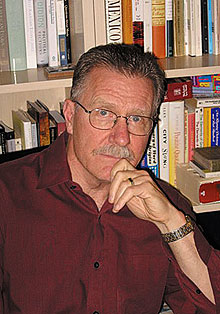  |
| HOME | THIS ISSUE | CALENDAR | GRANTS | BACK ISSUES | < BACK | NEXT > |
Sociologist takes peer-driven HIV intervention overseas by Beth Krane - October 27, 2008 | ||||
| An award from the National Institute on Drug Abuse (NIDA) has enabled sociology professor Robert Broadhead to adapt a proven HIV-prevention intervention he developed for injection drug users in Connecticut for use in regions of the world considered epicenters of drug-related HIV infection. Through a five-year NIDA Independent Scientist Award, Broadhead has been working since 2003 as a consultant and technical advisor to researchers and public health officials in Eastern Europe and Southeast Asia, where interventions for injection drug users are still in their infancy. Broadhead, who also is a principal investigator at UConn’s Center for Health, Intervention, and Prevention (CHIP), has tested modified versions of his peer-driven intervention for injection drug users in Russia, Ukraine, China, and Vietnam. CHIP has its roots in HIV/AIDS prevention. The model offers nominal cash incentives to active injection drug users to educate their peers about HIV in the community and to recruit them to local storefronts for testing and prevention services. Each active injection drug user who is recruited and provided services is asked to recruit three peers in return, so that the reach of the intervention grows exponentially. “The peer-driven intervention relies on those with the best contacts and most credibility among injection drug users – other injection drug users,” says Broadhead. “HIV prevention should not require different countries to reinvent the wheel,” he says. “Instead, Western research-based innovations need to be made available to developing countries as soon as possible.” Broadhead first developed and tested the peer-driven intervention in eastern Connecticut during the 1990s. During a four-year, three-site project in Yaroslavl Province, Russia, he tested a standard peer-driven intervention against two versions of the model with different reward structures. More than 3,100 active injection drug users were recruited and all three sites reported significant impact in reducing injection frequency and the sharing of syringes and other injection equipment and increasing injection drug users’ knowledge of HIV and how it is transmitted. At one site, Bragino, Broadhead implemented the standard peer-driven intervention, which pays active injection drug users for each peer they recruit to the project and for each recruit’s performance on a brief HIV knowledge test. At the second site, Rybinsk, he tested a simplified peer-driven intervention that pays injection drug users based solely on each recruit’s performance on the knowledge test. He found that injection drug users in Bragino recruited more peers for prevention services, but those in Rybinsk performed much better on the knowledge test.
“I found you get what you pay for,” Broadhead says. At the third site, Tutayv, Broadhead experimented with using food vouchers instead of cash rewards, but, after six months, switched to cash incentives because injection drug users were not responding to the vouchers. “Many injection drug users will avoid a project that offers food vouchers, for fear of being publicly identified as drug users at local grocery stores,” he says. “We found the cash rewards more ethically defensible, because they safeguard anonymity and ultimately increase their participation in prevention services.” A five-city pilot project in Ukraine has yielded such encouraging results that the Global Fund to Fight AIDS, Tuberculosis, and Malaria now is funding the implementation of the intervention at 16 new sites across the country. In Ukraine, almost one third of injection drug users are HIV-positive, with women twice as likely to be HIV-positive as men and older drug injectors significantly more likely to be HIV-positive, Broadhead says. “Preventing new HIV infections in Ukraine urgently requires accessing young and female injection drug users for services,” he adds. “Our pilot projects there showed that peer-driven intervention is able to recruit a very large number of injection drug users, including those in targeted populations, very quickly and at minimal cost.” Broadhead also has piloted the standard peer-driven intervention at two sites along the China-Vietnam border. Both sites experienced similarly high recruitment rates, both initially and for follow-up services six months later. The projects also saw comparable reductions in injection drug users’ risk behaviors and increases in their willingness to be tested for HIV and to participate in a drug treatment program. Broadhead says his results to date from the four different countries suggest his intervention is readily adaptable for other countries with high rates of drug-related HIV infection. His NIDA award will continue to fund global expansion of the peer-driven intervention model for one more year. |
| ADVANCE HOME UCONN HOME |

